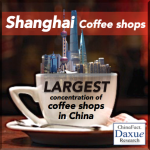Local coffee brands in China
LOCAL COFFEE BRANDS IN CHINA
Overview of the coffee market in China

According to data from China Coffee Association Beijing, the coffee consumption growth is increasing at an annual rate of 15 percent. Even if the population individuals drink an average of 5 cups of coffee per year, compared to the world’s average of 240 cups, the annual growth in China nowadays represents 7 times the world’s annual growth. However, local coffee brands in China are not taking full advantage of this trend and mainly are not the pioneer. The development of this market started in the 1980’s with the arrival of foreign brands in China. The current leaders on the market, Starbucks and Nestle, have played a significant role in spreading the coffee culture in China.
The Western culture of coffee in China was for long considered a trend, which was mostly affordable for high-middle class customers. Indeed, coffee is expensive in China, whether bought as instant coffee or in a café.
On the Chinese coffee market, it is most likely to find instant coffee which represents 80 percent of the coffee consumed in China. Often called 3-in-1 coffee, the solid drink is composed of coffee, powdered milk and sugar. Even if Chinese tend to drink more traditional black coffee nowadays, milk coffee remains people’s most appreciated beverage.
Its development and the competition with local coffee brands in China start to spread its consumption to other classes.
Chinese brands of coffee
At the end of the 19th century, coffee bushes where first introduced in China in the Yunnan Province by French missionaries, a region mainly dedicated to tea plantations. However, coffee growing truly started in 1980 with a plan on coffee farming established between the Chinese government and the United Nations Development Program. Thank to their local production with famers from the Yunnan and Hainan Provinces, where coffee plantations are mainly located, local coffee brands started to gain ground on the coffee market competition, even if they still own very little of the market share.
The local coffee brands mentioned below are the most represented on the Chinese coffee market at local scale.
- Lisun力神
Founded in 1987 in Hainan Province, Lisun is the first company to introduce instant coffee in China. It became famous for its Coconut Coffee and Milk Sugar Coffee. The company possesses its own coffee plantation on Hainan Island. It diversified its range of products by developing different coffee flavors, drinks and by selling roasted coffee.
- Hogood后谷
Hogood is a Yunnan based company which was founded in 2007. It is one of China’s biggest home-grown coffee processors and one of the top selling local coffee brands in China. Hogood produces and sells roasted coffee, including whole bean, ground coffee and instant. It also exports its products to Europe and Korea.
- Nanguo南国
Established in 1992, Nanguo uses distinctive products of Hainan such as coconut and coffee in order to develop its products. Its coffee based products are mainly sold as solid drinks including coconut coffee and “Tan Shao coffee”, a powdered one.
- Fushan Coffee福山咖啡
Fushan Coffee was founded in the 1980s in Hainan Province and its business is focused on growing, transforming and selling coffee. The company is one of the leaders on coffee culture on Hainan Island and one of the main local coffee brands in China.
Chun Guang春光
Founded in 1996 in Hainan, Chun Guang growscoconut and coffee that are used to develop sweets, beverages or biscuits. The products are sold in China but also exported to about 30 countries. Chun Guangsells roasted powder coffee and instant coffee.
The bright future of the coffee market in China
Despite the expansion of coffee on Chinese market, it is unlikely that coffee will replace tea as part of the Chinese culture. However, more and more Chinese are enjoying drinking a cup of coffee once in a while. With the development of local brands and especially the Chinese production of coffee, the market has a great development potential which is estimated to reach an annual rate up to 20 percent. Apart from coffee retails; coffee shop in China and foreign café branches, countless independent coffee are now opening is every small to mid-range cities enabling people to learn more about this beverage so popular for Westerners.
Source :
http://www.forbes.com/2010/04/28/starbucks-china-consumers-markets-economy-coffee.html
http://www.china.org.cn/business/2014-06/13/content_32658468.htm




![[Podcast] China paradigm #15: How to successfully run a coffee shop chain in China](../wp-content/uploads/2018/12/Daxue-consulting_china-paradigm_Carol-Liu-Big-Sur-Tea-and-Coffee-150x150.jpg)









